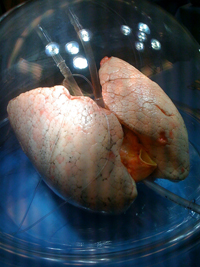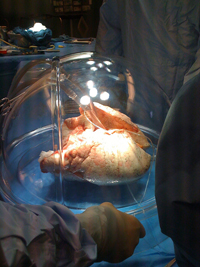For the first time, scientists at Toronto General Hospital, University Health Network have shown in a clinical trial that the Toronto Ex Vivo System can safely and effectively treat, re-assess and improve the function of high-risk donor lungs so that they can be successfully transplanted into patients. The use of this technique could significantly expand the donor organ pool and improve outcomes after transplantation.
In their pioneering work, a team of researchers led by Dr. Shaf Keshavjee, Senior Scientist at the McEwen Centre for Regenerative Medicine, University Health Network (UHN), Director of the Toronto Lung Transplant Program, Toronto General Hospital, UHN and Surgeon-in-Chief, UHN showed, in their latest research on this world-first technique, that using high-risk donor lungs which were improved and re-tested in the Toronto Ex Vivo Lung Perfusion System before transplantation led to results that were similar to those using conventional donor lungs.
 Their study, "Nornothermic Ex Vivo Lung Perfusion in Clinical Lung Transplantation" is published in the April 14, 2011 edition of the New England Journal of Medicine. Drs. Keshavjee and Marcelo Cypel are presenting the long-term outcomes of this study at the International Society for Heart and Lung Transplant in San Diego on April 14 at 9:00am (Pacific Time).
Their study, "Nornothermic Ex Vivo Lung Perfusion in Clinical Lung Transplantation" is published in the April 14, 2011 edition of the New England Journal of Medicine. Drs. Keshavjee and Marcelo Cypel are presenting the long-term outcomes of this study at the International Society for Heart and Lung Transplant in San Diego on April 14 at 9:00am (Pacific Time).
"This heralds a new era in transplantation where we can predict how well the organ functions before using it, we can help the organ heal itself, and ultimately, we can use the Toronto Ex Vivo as a platform to engineer 'super organs' for transplantation," says Dr. Keshavjee, who is also Director, Latner Thoracic Research Laboratories and Professor of Thoracic Surgery at the University of Toronto.
Currently, more than 60 patients are waiting for either a lung or heart-lung transplant in Ontario. About 20% of those on the wait list will die before they receive a lung transplant. In Canada, the number of people waiting for a lung transplant has doubled in the past 10 years, with 252 Canadians waiting to receive a lung transplant in 2006, compared to 119 in 1997. Two hundred and ninety-nine (299) Canadians died while waiting for a lung transplant between 1997 and 2006.
The study was supported by Vitrolife Inc. and approved by the Research Ethics Board of UHN. Vitrolife was not involved in the conduct of the study, the analysis or storage of data, or the preparation of the manuscript.
About Toronto General Hospital, University Health Network
Toronto General Hospital is a partner in the University Health Network, along with the Toronto Western Hospital and the Princess Margaret Hospital. These research hospitals are affiliated with the University of Toronto. Toronto General Hospital is a national and international source for research, education and patient care, and is recognized internationally for its innovations in transplantation, surgical innovation, infectious diseases, diabetes and genomic medicine.
 The lung transplant program is one of the largest in the world, performing about 100 transplants a year. It is renowned worldwide for its innovation and comprehensiveness in treating patients with severe and complex lung diseases. A pioneer in research on how best to preserve fragile lungs, the program is currently developing new molecular diagnostic and treatment strategies to repair and improve the quality of donor lungs, which could increase the number of transplants performed and survival after transplant.
The lung transplant program is one of the largest in the world, performing about 100 transplants a year. It is renowned worldwide for its innovation and comprehensiveness in treating patients with severe and complex lung diseases. A pioneer in research on how best to preserve fragile lungs, the program is currently developing new molecular diagnostic and treatment strategies to repair and improve the quality of donor lungs, which could increase the number of transplants performed and survival after transplant.
About the McEwen Centre for Regenerative Medicine
The McEwen Centre for Regenerative Medicine was established in 2003. Its mission is to be a catalyst for regenerative medicine by facilitating collaboration and promoting research and awareness in the field. The McEwen Centre's ultimate goal is to accelerate the development of better and more effective treatments for life-threatening conditions such as heart disease, diabetes, respiratory disease and spinal cord injury. The McEwen Centre for Regenerative Medicine is fully affiliated with University Health Network.
Media Contact: 416 340 4636
